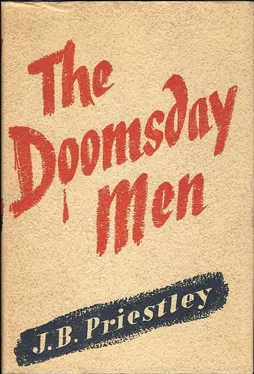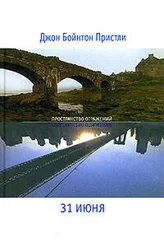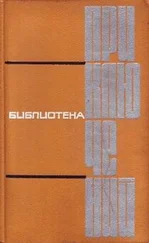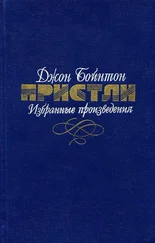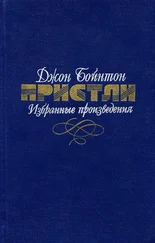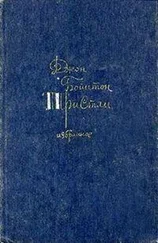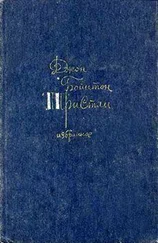Nevertheless, high above the burning wreckage, the white figure still raised its arms, to give the final signal, ignoring the confusion and tumult below. As the arms fell, it seemed as if the earth gave a shiver and then split. All the watchers were struck down as if by a hammer; the air went screaming above their prone bodies; the ground shuddered and heaved; and only half-conscious now they heard dimly the earthquake thunder of toppling buildings. It was indeed like the end of the world.
Yet after some moments, which in their fear, darkness and utter confusion could not be reckoned by ordinary time, one after another they lifted their aching heads, and looked to see what had happened. The tower had vanished; the house itself was a ruin; and the steep slope behind was scarred and fissured, and still seemed to smoke like a battlefield. A vast cloud of dust was rising slowly above the head of the valley. The sky was thick and yellowed. The air was hard to breathe. From the ruins there came licking out a long thin tongue of flame, and now in the terrible silence, like that which accompanies a deeply ironic stare, they could hear the crackling of fire. Malcolm and Andrea, Jimmy and Hooker were shaken but not hurt, and those near them were also uninjured. But some of the brethren farther along the hill-side were still lying motionless. One of the guards who had been posted near the tower could be seen crawling out of the wreckage, bleeding as he came. Most of the others must have been killed. The three MacMichaels were buried in the ruins of their tower.
It was then as if the world, which had laughed at the warning messages of last night, was suddenly awakened by the final crash itself, or the air that had fled screaming from the valley had carried with it rumours of catastrophe; for within a few hours planes filled with reporters, cameramen, radio and news-film commentators, and the like, were roaring and circling over the ruins, and a host of cars were burning up the road through Barstow, which, distant though it was from the actual scene, now became the headquarters of the news campaign and found itself suddenly famous. All that night the world stared at its headlines and listened to its broadcast news in wonder and amazement that were clouded with a new apprehension. A shudder of fear went through the world as the commentators drew vivid and largely imaginary pictures of the narrow escape everybody had just had, as distinguished scientists, dragged out of their quiet sane laboratories into the shrieking arena of big news, talked of this possibility and that, as photographs of the ruined remote valley went jerkily across a myriad screens to the accompaniment of shouting voices explaining what had been attempted and what might have happened, those voices so hot with human interest and yet so strangely inhuman in their amplified mechanical excitement. Now that they were dead and gone, the three MacMichaels suddenly cast shadows that stretched menacingly across whole continents and oceans. Their sinister biographies blackened innumerable columns. Dubious dots to represent their faces were flashed from capital to capital. Thus as the arch-criminals of our time they towered while what remained of them on earth still lay beneath their own ruined tower. To end the world? Millions of men and women stared at each other, their minds busy with crashing images of destruction. For an hour or two, clouded by this vision of what might have been, the producers forgot to blame the distributors; the distributors forgave both producers and consumers; the industrialists and the bankers were at one; the farmers stopped disliking the city folks; men who worked in black coats made common cause with men who worked in overalls; associations of employers made light of trade unions; capitalist and proletarian remembered they shared the same earth; fascists and communists were haunted by the same vision; patriotic imperialists failed to salute the battle-torn flags waving above their dividends; foreign secretaries neglected the drafted agreements that nobody intended to keep; the Class Struggle, the Red Menace, the Fascist Will, the Jewish Problem, the German Destiny, the Failure of the New Deal, the Decadence of Britain, Japan Over Asia, Italy Over Africa, Stalin Over Russia, the Threat to Democracy, the Decay of Liberalism, the Collapse of Civilisation, all were temporarily forgotten, and for a few hours all the currents of prejudice and mistrust and fear and hate were dammed behind one gigantic barrier, and though men were haunted by this one dark vision of doomsday, somehow for that little time they breathed a larger and nobler air. It did not last long, of course, for we live in an eventful age and have a magnificent news service, and so, flinging a few last curses at the memory of those three insane brothers who had tried to destroy the world at one stroke, men returned to their ordinary tasks and thoughts, perhaps to destroy the world piece by piece.
Towards the end of that insane day, which remained just as much a nightmare after the world had discovered that it was not to be destroyed, Andrea and the three friends fled from the scene, now rapidly turning into a vast garbage heap, lit by photographers’ flash-lights and raked through by newspapermen. Jimmy had had a bright idea, and packing them into Andrea’s big car had driven them himself, as fast as he could go along those narrow roads, with much blinding traffic coming into the valley, and with many stops when he was not sure of the way, over the dark mountains and under the wide glitter of stars, to another remote valley and a little ranch there, where there was as yet no hostess to look after them. But they were all still dazed and completely exhausted, and throwing themselves down anywhere they slept and slept, and were hardly fully awake when Mrs. Atwood herself arrived in the middle of the following afternoon. And there they stayed, telling their stories over and over again, under the peaceful sky, for many days. Mrs. Atwood, brighter of eye than ever, for even when she remembered Charlie her eyes were bright with tears, tears of pride as well as of sorrow, fussed happily over them; and she made Andrea, who was very quiet, very mournful, these days, and even kept aloof from the bewildered and unhappy Malcolm, answer all her questions so that the girl could not imprison herself in her silent brooding. Malcolm wandered and wondered about the place, a pale, gloomy, handsome young man, asking himself what was to be done next. Jimmy and Hooker, sent off with smiles and nods by their hostess, mysteriously departed for Barstow and, after that, Los Angeles, to return with Jimmy’s baggage and a host of things for the others at the ranch.
Now it was the morning after they had returned, a late October morning as clean as a new pin, with the little valley all smiling and the hills all sparkling and winking. Jimmy had gone off by himself in good time, taking his easel and paint-box to a little rocky knoll overlooking the ranch-house. Hooker was sprawling in a deck-chair under one of the cottonwoods, but not idling, for he never lifted his eyes from the notebook he held, a notebook that never seemed out of his hand now. Malcolm, becoming desperate, had implored Andrea to come into the sunshine with him and she had at last agreed, after being strongly urged to go by Mrs. Atwood, who pretended that she could do nothing round the place if they did not leave her to herself in the mornings, but seemed to be more full of smiles and nods and little secrets than ever. Indeed, when the lovers had gone, she appeared to be curiously expectant and kept looking down the road through the valley. She also took quite a number of peeps at Mr. Edlin, who could just be seen painting away on the hillside, but when she looked in that direction, the smiles and nods vanished, and it appeared then as if she were a bit anxious and a bit disappointed and in general rather puzzled by and dissatisfied with the distant Jimmy, so entirely absorbed up there.
Читать дальше
